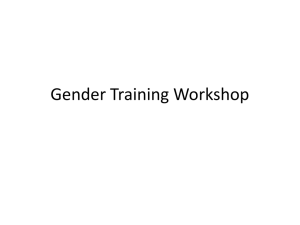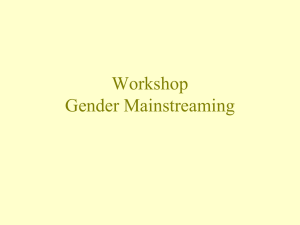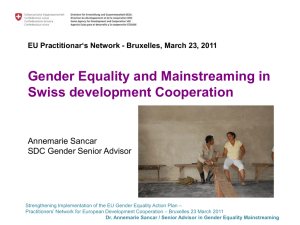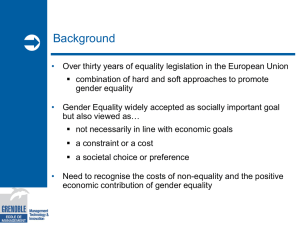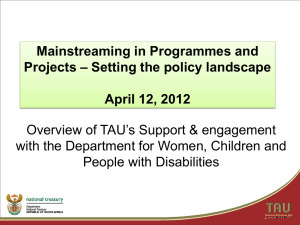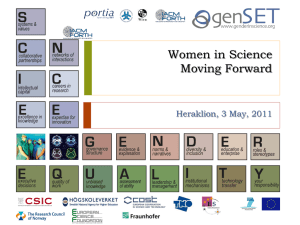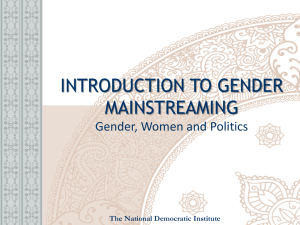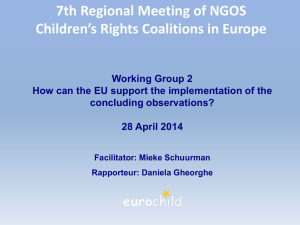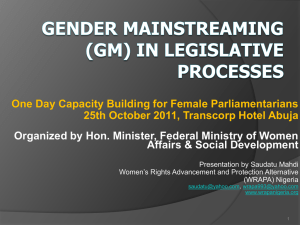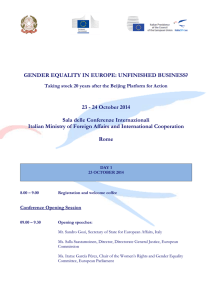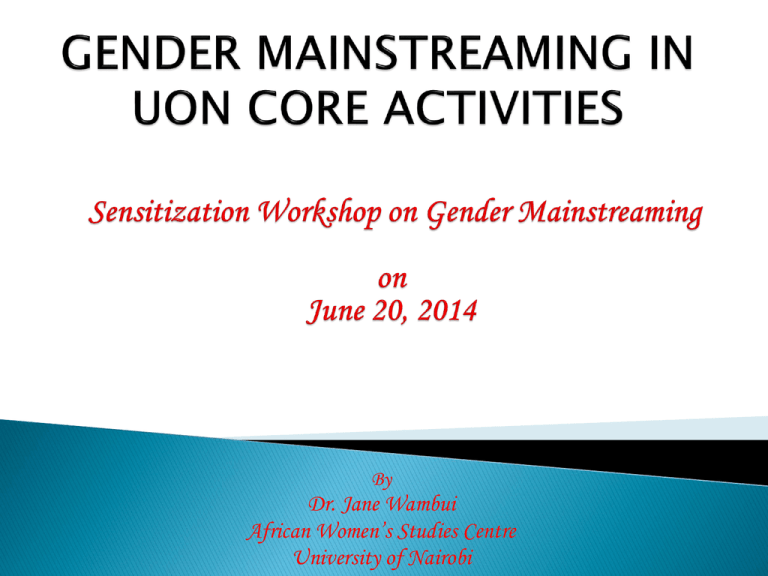
By
Dr. Jane Wambui
African Women’s Studies Centre
University of Nairobi
• Demonstrate an understanding of basic concepts
on gender
• Gain knowledge of relevance, effects and
impacts of gender mainstreaming in
development.
Basic Gender Mainstreaming Concepts
What is Gender Mainstreaming (GM)
UON Gender Policy, 2008
Components of UON Gender Policy
Gender Mainstreaming Division
College Based Gender Committees (CBGC)
Campus Based Focal Points
Realizing UON Gender Policy
Slow Pace of Implementation
Required Action
Assignment
Gender
Gender Roles
Sex Roles
Gender Equality
Gender Equity
Gender Issues
Gender Concerns
Gender Gaps
Gender
Stereotypes
Gender
Responsive
Gender Analysis
Gender
Responsive
Budgeting
Transgender and
intersex persons
-
Gender
Social construction of roles, responsibilities
and behaviour patterns assigned to men and
women, boys and girls in respective societies
at a given time
Gender identity acquired through socialisation
Differs from one culture to the other
Changes in time
Sex – biological differentiation, natural and
permanent
"Male" and "female" are sex categories
List
three attributes of gender
List three attributes of ‘sex’
List three attributes of culture
http://www.youtube.com/watch?v=IHLl
vXOJa3Y
Women menstruate while men do not
In my community, men are more
involved in herding cattle
Men have beards
Women breastfeed
Women are more involved in farming
Men get more government tenders
In war men are generally strong
fighters
Gender Roles
Socially defined
tasks/activities/duties/responsibilities ascribed to
men and women based on perceived differences
They differ by cultural and historical contexts.
Are gender roles due to cultural or social factors,
or due to biological and physiological differences
State roles that women and men play in your
community?
State three roles women have in the management
of UoN?
State three roles men have in the management of
UoN?
Sex Roles
• Biological differences between
women & men, which remain a
constant – does not change with
context
•Natural roles
•Cannot be interchanged
Men have limited sex and gender roles
compared to women
Men have more time to invest in other areas
that can be productive to them
Women have multiple gender and sex roles
and are tied up most of the time
Women have less time for training,
exposure, job searching
Women unlikely to accept assignments that
are time consuming or away from marital
home.
Gender Equality
so known as sex equality or sexual equality or
equality of the genders, implies that men and women
should receive equal treatment, unless there is a
sound biological reason for different treatment.
- Equal opportunities for women, men, boys & girls to
expression & in access to resources & services,
opportunities (education, employment, decision
making & promotion)
- Decision making & promotion important for upward
mobility
- Measured in terms of equality of opportunities &
equality of results or reward for labour
- Exists where sex-based discrimination is absent
Gender equality: denotes women having the
same opportunities in life as men, including
the ability to participate in the public sphere
And
Gender equity: denotes the equivalence in life
outcomes for women and men, recognizing
their different needs and interests, and
requiring a redistribution of power and
resources.
Often calls for affirmative action to allow fair
play – where there is competition for
resources & one group has an advantage over
the other
Gender Issues
-
-
Consequences of inequalities, inequity and
differential treatment between men &
women
Biases/discriminatory behaviour on basis of
sex or social roles – denial of education for
girl child; higher entry fees in clubs for
men/boys
Gender Concerns
- Triggered by disparities & imbalances which
cannot be ignored
- Disparities & imbalances viewed as unfair &
undesirable at all levels
- If imbalances & disparities do not cause
anxiety, then it remains a disparity & not a
concern
- Becomes a concern when majority realise
the problem push for change
Gender Gaps/Disparities
- Systemic differences in outcome that
men & women achieve in a sector
- Imbalance/differences that arise due
to social assigned gender roles, issues
Examples: gap between male and
female staff at different levels
Gender Responsive
- Taking into account gender gaps &
gender issues to inform plans,
implementation and design of any
process
Example: a responsive budget entail an
analysis of actual expenditure and
revenue of men & women adjusted to
address any gender inequality
Gender Analysis
- Systematic effort to research, document & understand
the roles of women & men in a given context & how a
given activity, decision or plan will specifically affect
men & women
- Exposes the advantages & disadvantages experienced
by women & men in relation to specific issues
Assists in understanding:
- Conditions
- Needs,
- Participation rates;
- Access to resources and development;
- Control of assets and,
- Decision making powers between men and women in
their assigned roles.
Gender Analysis Cont.
- Provide the basis for taking steps to
address disadvantages, & devising
remedial/preventive interventions
- Allows for equal representation of
women & men in shaping
development
GM is a strategy by which a gender
perspective & the objective of promoting
gender equality is included in all preparatory
work and decision making by authorities embedding of gender equality & equity into
analysis, planning, performance, policy,
monitoring and evaluation.
- Application has potential of changing
content and direction of practices at
organisational (daily life, projects and
programmes) and institutional level
- GM has to take into consideration the
triple role of women (reproductive,
productive and community) & roles of men
- The way roles are valued affect the way
women and men set priorities in planning
everyday activities, projects, programmes
and general management.
Is a strategy for achieving gender equality
Strategy to end gender blindness in
development process.
Implies integrating needs, concerns and
priorities of women, men, girls, boys and all
vulnerable groups in policies, plans and
program.
It ensures women & men, girls & boys have
equal access to& control over resources,
opportunities &benefits at all levels.
Gender sensitive institutions
Gender sensitive policies
Gender sensitive plans & programs
Institutions free from gender based
violence
Gender equity and equality
Sustainable development
Identify gender issues/concerns & strategies
for addressing them-Institutional gender
analysis
Develop a gender framework/policy
Establish gender committees or GFP
Collect sex-disaggregated data from your
sector ( for gender analysis)
Sensitize staff on G/M
Engender your programs and activities
Relevance of organisational gender policy
for gender mainstreaming
UoN Gender policy, 2008
- Aims at creating and sustaining fair and
just academic environment where women
and men have equal opportunities, voice,
rights and access to resources, so that
persons of both gender realise their full
potential and contribution within a
community of scholars and workers with a
culture of mutual respect
Summary of staff count by grade and gender 2011
Grade
male Female total
Vice-Chancellor
1
0
1
Deputy-vice Chancellor 3
1
4
Principals
5
1
6
Deputy-principal
2
0
2
Professors & Equiv.
99
13
112
Assoc. Prof & Equiv.
203 42
245
Sen. Lect. & Equiv.
301 106
407
Lecturer & Equiv.
611 235
648
Ass. Lect. & Equiv.
39
19
58
Tutorial Fellow & Equiv. 109 74
183
Student admission 2011
certificates
Diplomas
Undergraduates
Post Graduate Dip
Masters
PhD
Total
44
3,086
27,455
121
7,311
183
47
1,968
16,888
38
4,698
73
91
5,054
44,343
159
12,009
256
61, 912
-
Code of practice on:
Decision making organs
Recruitment, training and promotion
Student admissions
Gender sensitive curriculum
Working and learning environment
Role Models
Student organisations and Co-Curriculum Activities
University staff Awards
Examination & Coursework
Gender Violence
Staff & Student Welfare
Functions of Gender Division
Raise and sustain gender awareness within
the University;
Promote gender sensitive, friendly, inclusive
and secure environment in the University for
staff and students;
Ensure that gender parity in student
enrolment and performance is improved
across disciplines;
Promote gender equality in staff recruitment,
training and promotion;
Functions of Gender Division Cont.
Undertake the training of trainers in gender
analysis skills within the University;
Advocate and promote gender equality in
decision-making at all levels within the
University;
Establish and coordinate gender outreach
programmes incorporating schools,
colleges, media and cultural communities;
Functions of Gender Division Cont.
Promote the use of gender sensitive
language in all forms of communication;
Facilitate gender research;
Collect, analyse and update sexdisaggregated information on all sections of
the University system in order to monitor and
evaluate the relative positions of women and
men, and produce regular reports; and
Establish and maintain a comprehensive
resource centre.
Functions of Gender Division Cont.
Develop an effective and participatory monitoring
and evaluation system for periodic assessment of
progress and impact of gender mainstreaming
and for the enforcement of the UoN Gender
Policy;
Provide technical guidance and advisory support
to other units in their gender mainstreaming
efforts;
Establish public-private partnerships for research
collaboration, networking and funding; and
Coordinate the events of gender awareness week.
In collaboration with Gender Division responsible for:
Interpreting and domesticating the objectives of UoN Gender
Policy;
Ensuring that information and action flow to and from
departments, faculties, schools, institutes and other units
within the university;
Coordinating with Campus Based Gender Focal Points on
relevant gender activities and issues;
Providing quarterly reports on College gender activities and
issues;
Compiling Annual report on gender mainstreaming activities
and issues; and
Other matters determined by the committee to be of
relevance to gender mainstreaming within the college in line
with the UoN Gender Policy.
Each campus to have a gender focal point or
unit with full time staff assisted by part time
staff/student interns;
Responsible for identifying new gender issues
& offering advice on gender issues as well as
liaison with other organs & units of the
university; and
24 hour service delivered through a variety of
methods such as office staff during working
hours, help line outside office hours & other
lower structures as may be determined.
Integrate gender needs, concerns & priorities
in UoN Strategic Plan
Resources, facilities & Infrastructure
Teaching & Learning
Research, Innovation & Technology
Competitiveness of UoN
Collaborations & Partnerships
Scaling down to colleges, Institutes, Faculties,
Departments & Centres
Ensuring gender responsive management
and administration of the university and
equity in all teaching, research and
administration programmes;
Reaching out to marginalised groups
especially women, boys and girls;
Establishing appropriate administrative
structures to implement strategies in line
with the gender policy;
-
Partial implementation
Gender mainstreaming Division
College Based Gender Committees
Campus Gender Focal Points
Complaint Procedures
Resource Mobilisation
Monitoring and Evaluation Systems
Sensitization not a panacea for GM
Establish a baseline through research
Mapping and allocating available resources
- Identify and analyse how resources are
shared and used across gender
- Identify how services are provided across
gender
- If analysis shows skewed usage and/or
allocation the situation has to be addressed
and reallocation done
- Tendency to block analysis and reallocation.
Begin a responsive approach
Reflect on the situation in your various
Faculties, Departments, Institutes, Centers,
Sections and units and analyse the situation of
women and men in respect to opportunities,
and access to resources & services
Identify the challenges facing women and men
in respect to the above assessment
Come up with a strategy for ensuring that both
women and men have adequate and equal
opportunities to fully exert themselves.
Think of relevant indicators for monitoring &
evaluating ideal GM

